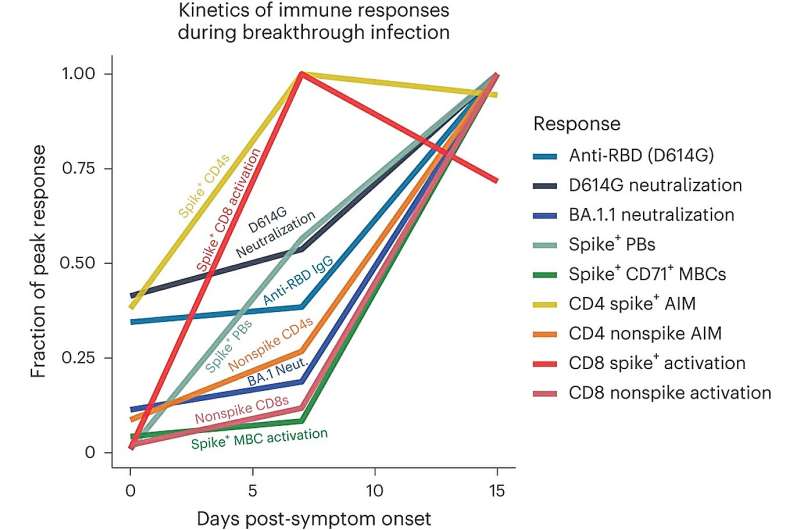This article has been reviewed according to Science X's editorial process and policies. Editors have highlighted the following attributes while ensuring the content's credibility:
fact-checked
peer-reviewed publication
trusted source
proofread
Study sheds light on immune response to COVID breakthrough infections

While COVID-19 breakthrough infections—a SARS-CoV-2 infection that occurs after receiving COVID-19 vaccines—can occur, for healthy individuals with vaccine-induced immunity, these breakthrough infections do not often cause severe disease. There has been limited research to uncover why these breakthrough infections do not lead to severe infections, until now.
A team led by researchers in the Perelman School of Medicine at the University of Pennsylvania identified potential clues that may enhance current vaccines through a detailed analysis of immune responses to breakthrough infections, published recently in Nature Immunology.
Immunologists generally have limited data on the dynamics of the immune response during breakthrough infections. In this study, the researchers set out to remedy that shortcoming for SARS-CoV-2 by cataloging immune responses to omicron breakthrough infections in unprecedented detail.
In their study, researchers examined the responses of B-cells (which produce antibodies) and T-cells (which can kill infected cells directly) in fully vaccinated individuals who became infected with SARS-CoV-2 during the early part of the omicron wave. They found that both B-cell and T-cell responses to these breakthrough infections are enhanced in vaccinated people, compared to unvaccinated people, generating the necessary "immunological memory" to prevent more severe infection.
The results also suggest that vaccine-primed memory T cells have an early-responder role that may be critical for preventing severe COVID-19.
"By identifying the contributions of memory B cells and memory T cells early in breakthrough infections, we now have clues to bolster the current vaccines and help further prevent the spread and impact of breakthrough infections," said study senior author John Wherry, Ph.D., Richard and Barbara Schiffrin President's Distinguished Professor and chair of Systems Pharmacology & Translational Therapeutics at Penn.
The SARS-CoV-2 vaccines were designed to provide durable protection against the virus by eliciting immune responses—in particular antibodies targeting its outer "spike" protein—specifically the spike protein of the original Wuhan strain. However, as the pandemic progressed, new SARS-CoV-2 variants with altered spike proteins emerged, including the omicron variant.
Omicron and its subvariants quickly became dominant, starting in late 2021, because they were much more transmissible—but also evaded antibodies more than prior variants, the world saw an increase in so-called breakthrough infections.
The study results also showed that in subjects who had been vaccinated, breakthrough SARS-CoV-2 infection triggered a coordinated, spike protein-specific response, featuring antibodies, antibody-producing B cells, and activated T cells—a more comprehensive and potent response to infection than was seen in unvaccinated subjects.
Moreover, these activated T cells appeared early and may be component of the immune response that prevents these breakthrough infections from progressing to cause severe disease. Instead, most breakthrough infections in fully vaccinated healthy people do not lead to hospitalization or death.
"Our study wasn't designed to test this, but we think it's likely that this early memory T-cell activation is critical for limiting viral replication, and thus limiting the severity of disease, in vaccinated individuals," said Mark Painter, Ph.D., a postdoctoral research fellow in the Wherry Laboratory and the study's first author.
More information: Mark M. Painter et al, Prior vaccination promotes early activation of memory T cells and enhances immune responses during SARS-CoV-2 breakthrough infection, Nature Immunology (2023). DOI: 10.1038/s41590-023-01613-y

















